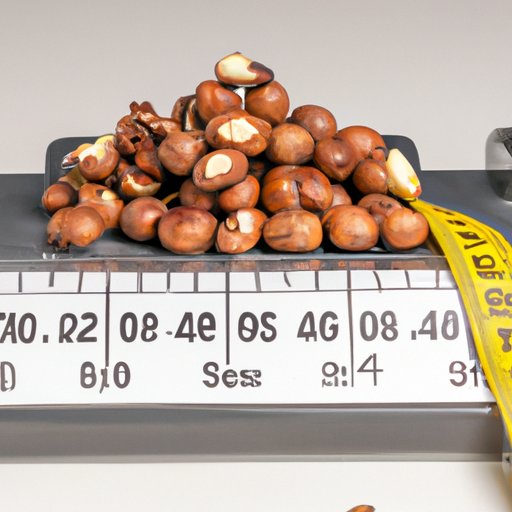Introduction
Nuts are a type of edible seed that grows in a hard shell. They’re eaten as snacks or used as ingredients in recipes all over the world. They’re packed with nutrients and have been linked to a variety of health benefits. But are they really healthy, or are there risks associated with eating too many nuts? This article explores the pros and cons of eating nuts and provides evidence-based recommendations.
Exploring the Health Benefits and Risks of Eating Nuts
Nuts are an excellent source of protein, fiber, vitamins, minerals, and healthy fats. Studies suggest that they may help reduce inflammation, improve cholesterol levels, and support cardiovascular health. For example, a systematic review published in Nutrients found that eating tree nuts (such as almonds, walnuts, and pistachios) was associated with lower total cholesterol and LDL cholesterol levels.
However, there are some potential side effects associated with eating too many nuts. These include digestive issues, such as bloating and gas, as well as increased risk of allergies and sensitivities. Additionally, because of their high fat content, eating too many nuts can lead to weight gain.

Examining the Nutritional Value of Different Types of Nuts
Nuts come in a wide variety of shapes, sizes, and flavors. Each type of nut has its own unique nutritional profile. Here’s a look at some of the most common types of nuts and their nutritional values:
- Almonds: Almonds are rich in monounsaturated fats, vitamin E, copper, magnesium, and phosphorus.
- Walnuts: Walnuts are a good source of omega-3 fatty acids, magnesium, and phosphorus.
- Pistachios: Pistachios are rich in fiber, vitamin B6, thiamin, and magnesium.
- Cashews: Cashews are a good source of copper, zinc, iron, and magnesium.

Investigating the Role of Nuts in Weight Management
Nuts are often thought of as a “diet food” due to their high protein and fiber content. However, it’s important to keep in mind that nuts are also high in calories. For example, one ounce of almonds contains about 160 calories. Therefore, if you’re trying to lose weight, it’s important to monitor your portion sizes.
Studies suggest that nuts may help reduce hunger and promote satiety. For example, a study published in Appetite found that eating a handful of almonds as a snack before lunch reduced participants’ hunger levels and increased their feelings of fullness.
Does Eating Nuts Increase Your Risk of Heart Disease?
Nuts are often considered “heart healthy” due to their high content of unsaturated fats, including omega-3 fatty acids. These fats are known to help reduce inflammation and support cardiovascular health. In fact, a recent meta-analysis published in The American Journal of Clinical Nutrition found that eating tree nuts was associated with a reduced risk of coronary heart disease.
While nuts are generally considered beneficial for heart health, it’s important to note that they’re also high in saturated fat. Therefore, it’s best to enjoy them in moderation and combine them with other heart-healthy foods like fruits, vegetables, and whole grains.
Are Nuts Good or Bad for People With Diabetes?
Nuts can be a healthy choice for people with diabetes. They’re low in carbohydrates and contain important vitamins and minerals. Additionally, studies suggest that eating nuts may help improve blood sugar control and reduce the risk of developing type 2 diabetes.
It’s important to note that the glycemic index of different types of nuts varies. Nuts with a lower glycemic index, such as almonds and walnuts, are generally considered better choices than those with a higher glycemic index, such as cashews and pistachios. Additionally, nuts are high in fiber, which helps slow the absorption of sugar into the bloodstream.
What are the Best Ways to Enjoy Nuts?
Nuts can be enjoyed in a variety of ways. Raw nuts are a great snack on their own, while roasted nuts can add flavor and crunch to salads and other dishes. It’s important to note that some types of nuts, such as peanuts, may contain unhealthy additives. Therefore, it’s best to choose organic, unsalted nuts whenever possible.
Can Eating Too Many Nuts Lead to Weight Gain?
Although nuts are a healthy snack, it’s important to remember that they’re still high in calories. Eating too many nuts can lead to weight gain, especially if you’re not monitoring your portion sizes. Therefore, it’s important to practice mindful eating and only eat as many nuts as you need to feel satisfied.
Conclusion
Nuts are an excellent source of nutrition and have been linked to a variety of health benefits. They’re low in carbohydrates, high in fiber, and packed with essential nutrients. However, they’re also high in calories, so it’s important to practice portion control when eating them. Additionally, some types of nuts may contain unhealthy additives, so it’s best to choose organic, unsalted varieties whenever possible.
Overall, nuts can be a healthy addition to any diet. Just remember to practice mindful eating and enjoy them in moderation.
(Note: Is this article not meeting your expectations? Do you have knowledge or insights to share? Unlock new opportunities and expand your reach by joining our authors team. Click Registration to join us and share your expertise with our readers.)
